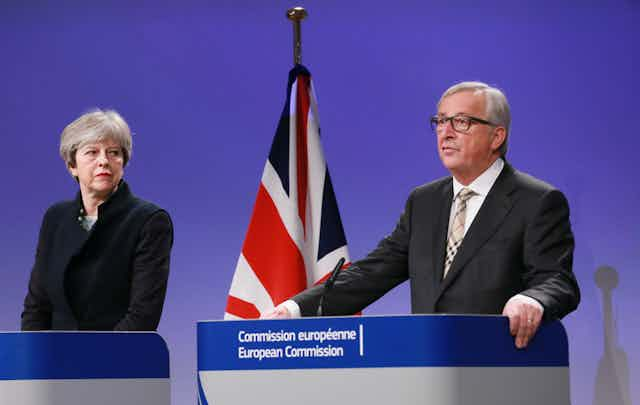The debacle that unfolded in Brussels on December 4 was a shambles on many levels – even by the standards of the Brexit talks, where rank amateurism on the UK side has long been the standard operating procedure.
The first formal Brexit meeting in July set the tone for what has followed over the past few months. Britain’s Brexit secretary David Davis was photographed turning up to the landmark talks without so much as a pen and paper. Meanwhile, on the other side of the table was a team of EU negotiators, armed with thick dossiers of notes in neatly arranged binders.
The most recent joint press conference, this time held by EU Commission president Jean-Claude Juncker and UK Prime Minister Theresa May was awkward. They had finally been ready to break some positive news and instead had to bite their lips, trying not to draw attention to what had become, behind the scenes, a diplomatic train wreck.
In fact, it all makes for an excellent case study of how not to negotiate. I’d use it with my students if it wasn’t quite so lacking in complexity. Start with a weak leader and a divided party, add a confused set of core objectives, agree to a text that you are not in a position to deliver on, reach an agreement with your main opponents and raise their expectations that you are primed to conclude a deal on those terms, then abandon your position at the last minute, leaving your negotiating partners dangling.

Irish taoiseach Leo Varadkar’s comment that he was “surprised and disappointed” that a draft text agreed by Dublin had not been signed off by the UK and EU was the sort of spectacular example of understatement that might have graced the lips of the most urbane of British diplomats. The only outcome from this sort of negotiating “style” is that you eventually come back to the negotiating table weakened and end up with an outcome based on less favourable terms than were available before.
However, Theresa May has had worse days – that’s how bad it is for her. By contrast, it looked like DUP leader Arlene Foster had a much stronger day. Her party flexed its muscles and torpedoed the deal, unable to control its collective gagging reflex over the “continued regulatory alignment” phrase at the heart of this aborted attempt at constructive ambiguity over the Irish border.
To the DUP, this sounded very much as if Northern Ireland was being awarded an opt-out on Brexit that aligned it with the Irish Republic. The DUP is adamant that it wants to leave the EU on the same terms as the rest of the UK and has been clear for some weeks that an opt-out arrangement for Northern Ireland was totally unacceptable. May and her officials will now surely be spending some time trying to calm DUP fears about exactly what “continued regulatory alignment” means. However, any backing away now from the interpretations already provided on this to Dublin and Brussels would be politically impossible for them to accept – even if they wanted to.
Ireland’s gain
So what have we learned from this sorry episode? One key message to be drawn is that, notwithstanding the DUP winning the latest battle, it is Ireland that is winning the war. The DUP is experiencing a temporary period of influence over the current minority government but that won’t last forever, even with a good wind. And with every gaffe-strewn week that passes, the current government’s grip on power looks increasingly tenuous.

The Irish Republic, for so long the minor partner in its relationship with the UK, is experiencing an unparalleled phase of influence in Anglo-Irish relations and it looks set to remain in a dominant position in the months and years ahead – certainly until March 2019, assuming the UK continues to pursue a negotiated deal with the EU and tries to have it ratified by the other 27 states. That eventual deal will shape the political and economic future of the UK (perhaps whether there even continues to be a UK) for the next 25 to 50 years.
The Irish Republic effectively has a veto on any deal that the UK wishes to make with the EU. That veto has its limits, admittedly. A “no-deal” outcome would be economically disastrous for Ireland, so any black-balling from Dublin in the final analysis is far from a cost-free option. Notwithstanding that caveat, who does the UK need as an ally to ensure it gets the best settlement that it can? That would be Ireland – not the DUP. That inescapable fact will shape what happens between now and 2019 and conceivably into the transition period beyond that.
Arlene Foster and her party might care to ponder that going forward, irrespective of whether or not the DUP tail can continue to wag the Tory government dog in the short term.

